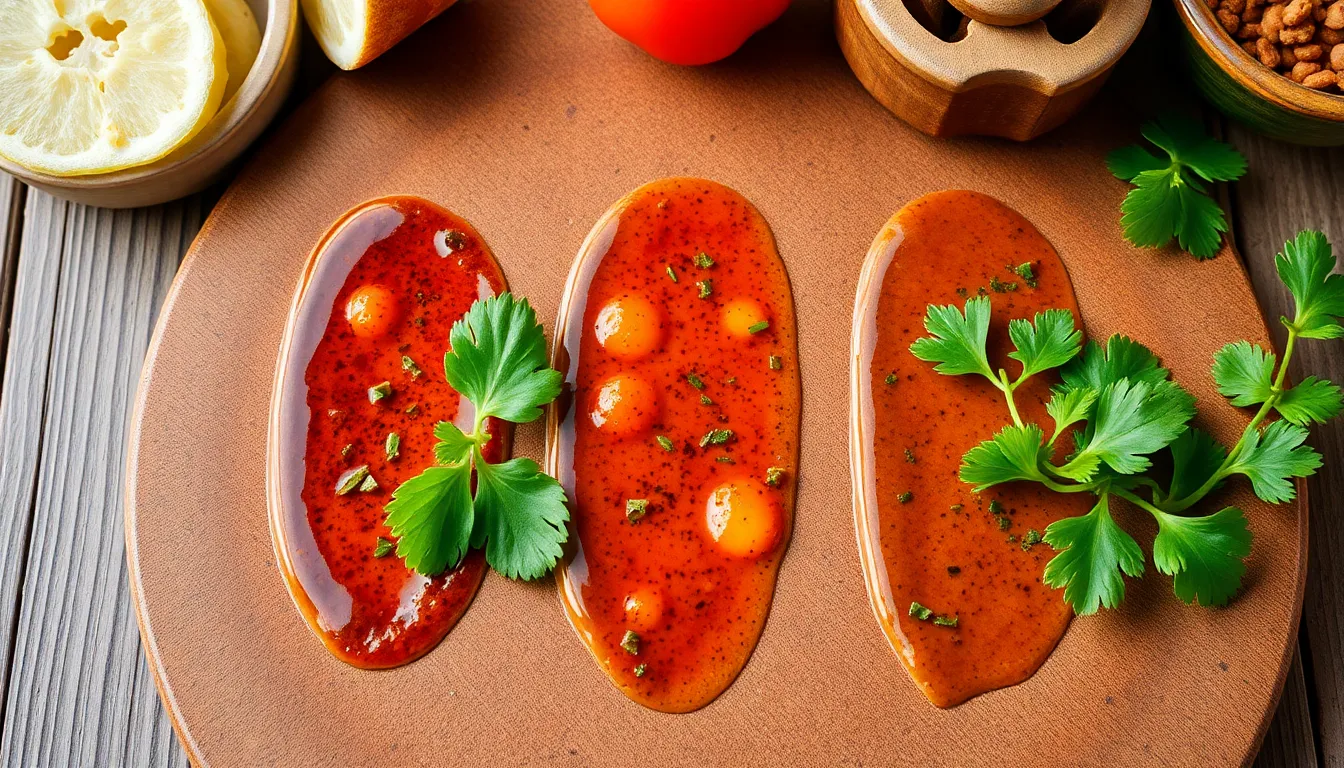Marinade Variations: Get Creative in the Kitchen
Introduction
Marinades are a cook’s best ally when it comes to elevating the flavor of meats, seafood, and vegetables alike. They serve not just to enhance taste, but also to tenderize proteins, making them juicier and more succulent. The art of marinating is both a science and a culinary tradition, allowing for endless creativity in the kitchen.
In this article, we will explore the world of marinades, including their fundamental components, the science behind marinating, and innovative variations that will inspire you to unleash your culinary creativity. From classic combinations to international inspirations, there is a marinade waiting to transform your next dish!
Section 1: The Basics of Marinades
Subsection 1.1: What is a Marinade?
A marinade is a flavorful liquid mixture in which food is soaked before cooking. Typically used for meats, seafood, and vegetables, marinades comprise three essential components: an acidic base, oil, and a variety of seasonings.
- Acid: Common acids include vinegar, citrus juice, and yogurt, which help to break down proteins and enhance flavor.
- Oil: Oils such as olive oil or sesame oil add richness and help carry flavors into the food.
- Seasonings: Herbs, spices, and aromatics introduce additional flavor and complexity.
Subsection 1.2: How Marinades Work
Marinating works on a molecular level. The acid in a marinade breaks down muscle fibers, allowing the flavors to penetrate deeper into the protein. This process not only tenderizes the meat but also infuses it with flavor.
Different proteins require varying marinating times:
- Poultry: 30 minutes to 2 hours
- Beef: 1 to 24 hours (depending on the cut)
- Pork: 1 to 6 hours
- Fish: 15 to 30 minutes
- Vegetables: 15 minutes to 1 hour
Section 2: Classic Marinade Components
Subsection 2.1: Acidic Bases
Acidic bases are crucial in a marinade as they provide tanginess and aid in tenderizing. Here are some popular choices:
- Vinegar: Balsamic, apple cider, and red wine vinegar.
- Citrus Juice: Lemon, lime, and orange juice.
- Yogurt: A creamy option that adds tanginess and moisture.
For balancing flavors, a common ratio is:
- 1 part acid
- 1 part oil
- 1-2 parts seasonings
Subsection 2.2: Oils
The oil in a marinade acts as a carrier for flavors and helps the marinade adhere to the food. Some popular oils include:
- Olive Oil: A classic choice with a robust flavor.
- Sesame Oil: Great for Asian-inspired marinades.
- Coconut Oil: Adds a tropical twist and richness.
Using a good-quality oil can elevate your marinade’s overall flavor profile.
Subsection 2.3: Flavor Additions
To achieve depth and complexity in your marinades, consider adding various herbs, spices, and aromatics:
- Herbs: Fresh or dried herbs such as thyme, rosemary, basil, and cilantro.
- Spices: Paprika, cumin, coriander, and chili powder.
- Aromatics: Garlic, ginger, green onions, and shallots.
Experiment with different combinations to find your perfect blend!
Section 3: Unique Marinade Variations
Subsection 3.1: International Inspirations
Many cuisines around the world showcase unique marinades that reflect their cultural heritage. Here are a few to inspire your next culinary adventure:
| Cuisine | Main Ingredients | Flavor Profile |
|---|---|---|
| Asian | Soy sauce, ginger, garlic | Umami, savory |
| Mediterranean | Lemon, olive oil, oregano | Bright, fresh |
| Latin American | Lime, cilantro, chili | Spicy, tangy |
Subsection 3.2: Sweet and Savory Combos
Incorporating fruits into your marinades can create delightful sweet and savory combinations. Here are some fruit-based ideas:
- Pineapple: Pairs well with soy sauce, ginger, and garlic for a tropical twist.
- Mango: Combine with lime juice, chili powder, and cilantro for a refreshing marinade.
- Peach: Use with balsamic vinegar, rosemary, and olive oil for a summer flavor.
These fruity marinades work wonderfully with chicken, pork, or even grilled vegetables!
Subsection 3.3: Vegetarian and Vegan Marinades
Marinades aren’t just for meat! They can add a burst of flavor to plant-based proteins like tofu and tempeh, as well as vegetables. Consider the following tips and recipes:
- Tofu: Use a marinade of soy sauce, ginger, and sesame oil. Press the tofu to absorb more flavor.
- Tempeh: Try a smoky marinade with liquid smoke, maple syrup, and apple cider vinegar.
- Vegetables: A simple combination of olive oil, garlic, and lemon juice can elevate the taste before grilling or roasting.
Section 4: Application Techniques
Subsection 4.1: Proper Marinating Techniques
To maximize the effectiveness of your marinating process, consider these best practices:
- Timing: Always adhere to the recommended marinating time for different proteins.
- Containers: Use non-reactive containers such as glass or plastic for marinating; avoid metal.
- Refrigeration: Always marinate in the refrigerator to prevent bacterial growth.
Additionally, here are some dos and don’ts:
| Dos | Don’ts |
|---|---|
| Do use fresh ingredients for the best flavor. | Don’t reuse marinades unless boiled first. |
| Do marinate meat in a sealed bag for even coverage. | Don’t marinate for too long, as it can turn mushy. |
Subsection 4.2: Cooking with Marinades
Once your food has marinated, it’s time to cook! Here are some techniques to enhance your dishes:
- Grilling: Marinades can help create a beautiful char while keeping the meat moist.
- Roasting: Use marinades to add robust flavors that will permeate during the cooking process.
- Stir-frying: Quick cooking methods allow for retaining the marinade’s flavors while cooking proteins at high heat.
Remember that the best marinades can serve as a sauce too—just be sure to cook them first to kill any bacteria from raw meat.
Conclusion
Exploring the world of marinades opens up a realm of flavor possibilities in your kitchen. By mastering the basics and trying out unique variations, you can transform ordinary meals into extraordinary culinary experiences. Whether you lean towards classic combinations or innovative international flavors, the right marinade can make all the difference. So grab your tools, gather your ingredients, and get creative—your next delicious dish is just a marinade away!




